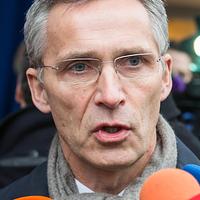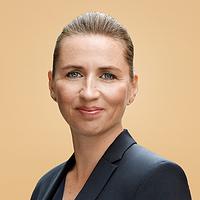Good morning to all of you. Prime Minister Mette Frederiksen, Mette, it's great to be here together with all of you today. And Mette, thank you so much for your leadership, your strong commitment to the Transatlantic Alliance, and for your friendship.
And as you just mentioned, last time I was in Copenhagen, we visited the Niels Bohr Institute. We saw this… I don't know exactly what it was… a big thing inside a glass thermometer. I pretended I understood the questions which were written down before I arrived, and the questions… I didn't understand the questions and I didn't understand the answers – but I realized that this was extremely important and high end technologies, which are important for all of us.
And now we meet again, not at Niels Bohr Institute, but at this quantum conference, and I cannot speak on behalf of Mette, but I can speak out enough myself: I have the same feeling. I've actually read on the plane two articles about quantum physics. Well, it is interesting but what we understand is that, even if we don't understand all the complexities of this new technology, we understand that this really matters for our society, and not least for our security, and that’s the reason why conferences like this are so extremely important, why it matters that we convene together with the private sector, the public sector and NATO to address both the challenges but also the opportunities that quantum physics provides to all of us.
And therefore there is no better place to host this conference than here in Copenhagen. Denmark is not only a strong and valued NATO Ally. It is also a driving force behind NATO's innovation agenda, and a leader in the field on quantum technologies in Europe. As Mette just referred to, Niels Bohr also had his home in Denmark and of course, as a Dane, a quantum physicist and Nobel Prize winner, but also one of the major minds behind the invention of the atomic bomb. This was a complicated and controversial invention, but vital for the free world. Not only to end the Second World War, but also to obtain our technological edge.
And today, Denmark, and all of you in different ways, help us to maintain and sharpen this technological edge. It matters greatly for our security. The competition to develop and control new technologies is intensifying. Russia is investing in and using disruptive tech to test our resilience and our resolve. And China is investing massively in artificial intelligence, big data, quantum and more. Beijing is integrating these new technologies into its military capabilities with no transparency and little regard for human rights. NATO has always adapted to and adopted new technologies to keep our people safe. With the rapid spread of disruptive technologies, we must adapt further and faster than ever before, including in the field of quantum.
It is safe to say that not all of us fully understand quantum technologies.
It is safe to say that not all of us fully understand quantum technologies.
I watched the movie “Oppenheimer”, it was a good movie but along the way I realized then, once again, that there are limits to what economists can understand in the field of these kind of physical sciences. But, as I said, we understand that it matters and we should all be able to understand the transformative impact on our security, both good and bad. Quantum technologies can significantly improve our performance, or our detection in navigation and radar systems, but also help competitors track our equipment. They can strengthen our cybersecurity, but also crack it, breaking encryption and compromising secret communications. So we need to make sure that these technologies work for us, and not against us. We need to develop and adopt them at speed and scale. And for this, we need Transatlantic quantum cooperation, we need a Transatlantic quantum community.
NATO is an indispensable part of this transatlantic quantum community. We bring together Allied nations that are leading the way on quantum in Europe, including Denmark, France, Germany, the Netherlands, and the United Kingdom, together with Canada and the United States, on the other side of the Atlantic. We also bring together the public, private and the economic sectors to drive innovation across the Alliance.
This is what NATO's Defence Innovation Accelerator for the North Atlantic does – or DIANA. DIANA is a network of test centres and accelerator sites across NATO countries, where innovators develop new technologies to solve some of our biggest security challenges. So, therefore, I thank Denmark for hosting a DIANA accelerated sight and a test centre here in Copenhagen, demonstrating the leading role of Denmark in these new technologies. And for Denmark's contribution to the NATO Innovation Fund. This first ever multi sovereign Investment Fund will support innovators across the Alliance, people like you present here today.
By the end of this year, NATO will also have our own quantum strategy to ensure our Alliance is quantum ready, able to integrate the right technologies into our capabilities and to protect against the adversarial use. For all of this, we need to collaborate better, innovate faster, and compete harder.
So thank you again, for hosting this conference. Thank you, Mette, for sharing this stage with me. And thank you so much to all of you for helping and supporting the efforts of NATO to develop our quantum strategy. Thank you so much.

